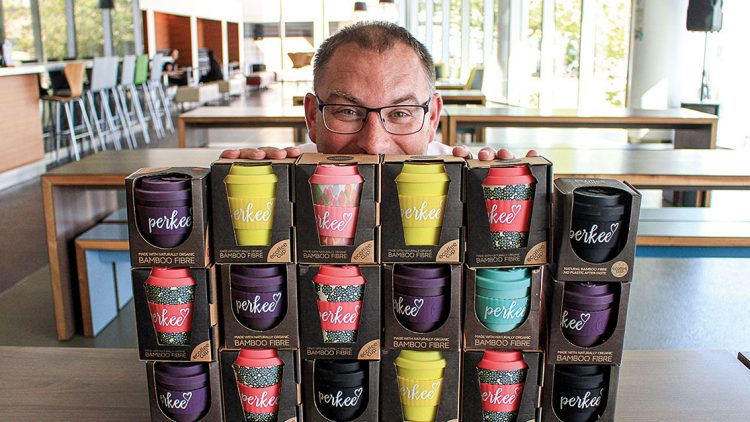
Plastic isn’t evil; for many parts of our daily lives, it is essential, from the technology we use to the medicines we take. In the food industry, plastic enables food safety and helps prevent food waste.
Still, there’s no denying the world has a plastic problem – not from its use, but from what happens to it afterwards. Single use plastics (SUPs) are a major environmental issue, now more than ever as pressure for change continues to grow. As a society, we use too many plastics which can’t be recycled, and we don’t actually recycle the ones that can!
We have come up with five steps to help you and your contract caterer deal with this plastic problem.
1.Understand your plastic use
Before any problem can be fixed, it first has to be understood. There are multiple plastic packaging self-audit tools available online to aid at this revealing phase. We recommend The Sustainable Restaurant Association’s Self-Audit worksheet (1) to help you in this process.
Audit your site to understand your current practices by asking: What is being used? Where? At what volume? By whom?
Next, do the same with your suppliers to understand your packaging specifications, what you are receiving, how much as well as what happens to the packaging after it’s used. Will the supplier collect it and recycle it?
2.Make a plan
Once you know what your plastic use is, you can develop a plan to tackle the problem.
Identify non-essential plastic and decide how you are going to reduce it. Set reduction targets and determine how you will achieve them. Be honest with yourself and your caterer – it would be great to decide you’ll make drastic reductions, but ensure the targets you set are SMART (specific, measurable, realistic and time-bound).
Work with your clients’ waste contractor to understand their recycling methods and streams; some contractors and councils have more thorough recycling options than others. By understanding what can and can’t be processed in your area, you will be able to ensure that waste is properly sorted and handled.
Ensure that education and training is included in your plan, too! If your team and customers aren’t educated, they can’t help. We recommend including the following in your plan:
A group visit to your local materials recovery facility (MRF) so your catering and facilities teams understand what becomes of your waste
Educate your customers through effective signage and recognise their efforts in reducing single-use plastics.
3.Share results publicly
Ditch the disposable cups. Everyone loves a nice cup of tea or coffee, but with almost half of all hot drinks (2) being sold in disposable cups in the UK, they have a huge environmental impact. Most disposable cups are lined with plastic which cannot be recycled, and while many lids are recyclable, most people don’t bother. In fact, it’s estimated that only 1% of these cups are recycled.
The first step is to ban your catering team from using disposable cups, instead offering reusable keep cups or crockery. When we implemented this policy at bartlett mitchell we immediately saved half a million disposable cups going to landfill every year. By introducing reusable cups for your customers, you can also encourage them to take up these environmentally-friendly options.
While in the past, reusable cups have contained environmentally unfriendly materials, nowadays there are more responsible options. For example, BM sells Huskups at our Perkee cafes. These cups are made of rice husks, and are fully biodegradable, while still remaining sturdy and reliable. Similar cups use bamboo fibre, stainless steel or glass in place of plastic. Check that reusable cups don’t contain melamine resin.
Add a levy to disposable cups. bartlett mitchell took part in a study by Cardiff University (4) – the only contract caterer to do so – which showed that by introducing a charge on disposable cups, customers are encouraged to choose reusable keep cups. When Parliament introduced a 25p surcharge to disposable cups, they saw a 74.3% drop in their use, with no impact to overall sales (5).
We have also introduced both a financial penalty for customers who use a disposable cup and a financial incentive for customers using a reusable. This reduced disposable cup use by 38% in 3 months.
For those customers who do use disposable cups, make sure you communicate where and how to recycle these cups. Consider using a recycling company that specialises in recycling disposable cups and set up a recycling bin specifically for cup collection.
To motivate your catering team and customers, keep track and communicate progress, such as displaying the number of disposable cups used or the percentage recycled, versus the number of drinks served.
Be creative! To grab customers’ attention, Tim, our enthusiastic catering manager created a gigantic display showing customers exactly how many disposable cups they were using every month. This impactful approach reduced customers’ disposable cup use by 28% in month one!
4.Unbottle the water
Bottled water has an enormous impact on the environment. While recycling empty bottles is better than binning them, it takes 2,000 times more energy to produce and transport bottled water than it does tap water. And rather than reuse the bottles – only around half of which are recycled within Europe – most are recycled into plastic pellets and shipped abroad to be turned into textiles.
To reduce your team’s and customer’s reliance on bottled water, first make sure tap water (6) is readily accessible to everyone who comes into your café. Sales of reusable bottles can also greatly reduce customers’ reliance on bottled water.
If tap water is hard or unpalatable in your area, investigate water filtration systems such as Zip taps.
If it’s not possible to completely remove bottled water, make sure the bottles used are made of 100% recyclable plastic, such as APET, rPET or Bio-PET sold by organisations including Thirsty Planet. Through a link up with Pump Aid a donation for every Thirsty Planet bottle sold benefits communities who don’t have access to fresh water.
Also look for bottles made of recycled plastic, displaying the new Recycled Plastic Rating (RPR) ‘trust mark’ launched by Delphis Eco8. The RPR labels are designed to show customers how much of an individual product’s packaging is made from recycled plastic. Labels declare the percentage of recycled plastic content in the packaging, rather than state what might or might not be recyclable.
Ask your caterer to source products that are made of recycled plastics: don’t just focus on where it’s going, but where it’s come from.
5.Take away the takeaway
With the average lunch-break lasting only 22 minutes, not everyone is able to stop and eat their meals in the café. Unfortunately, most takeaway containers are made of plastics or plastic-treated paper with low recyclability.
Still, there are steps that can be taken to avoid takeaway containers. By simply defaulting to china or reusable containers, you can discourage single use containers from being used – and by keeping them behind the hot counter, where customers have to request them, this decreases use even further.
Where takeaway options are required, consider offering tiffin tins or reusable boxes as an alternative. Wood or corn starch cutlery is also highly encouraged; so long as the wood is untreated, it is fully compostable.
At salad bars, switch to refillable bottles for dressings and replace plastic sauce containers with paper ones or 100% recycled ones
Finally, and most importantly, educate your team! By training them on what can be recycled, where, and why they should do so, you will ensure that your efforts to reduce your plastic impact aren’t in vain. As your reduction of single use plastic improves, share this with your teams to keep them motivated to try even harder.
Finally, keep track of how much CO2 has been saved by limiting the use of single use plastics.
You can download our useful information leaflet here
Further information
Please contact us if you would like innovative ideas to improve your catering contract or if you need help reducing single use plastic in your catering operation.
- https://thesra.org/campaign/plastics/
- https://publications.parliament.uk/pa/cm201719/cmselect/cmenvaud/657/657.pdf
- https://www.independent.co.uk/extras/indybest/house-garden/coffee/best-reusable-coffee-cup-a7510606.html
- https://www.cardiff.ac.uk/news/view/687689-curbing-coffee-cup-usage
- https://www.foodservicefootprint.com/footprint-investigation-parliament-burnt-by-compostable-pledge/
- https://www.dw.com/en/life-cycle-of-a-plastic-water-bottle/g-17266360
- https://www.thegrocer.co.uk/plastic/trust-mark-looks-to-highlight-recycled-plastic-content-on-packaging/597758.article
You can find more information about our Expert Guides here
Share on:
Find out how we can help you develop a contract catering strategy for your workplace catering
Contact us